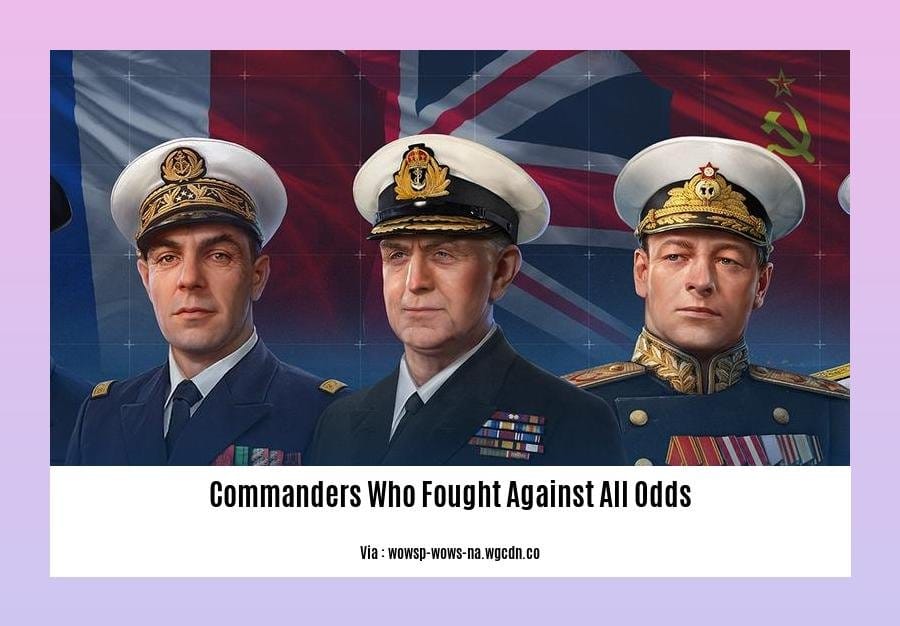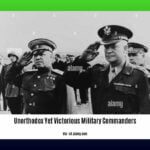Prepare to be awestruck by the gripping tales detailed in “Commanders Who Fought Against All Odds: Remarkable Tales of Triumph Over Adversity.” This article unveils the extraordinary journeys of commanders who, in the face of overwhelming challenges, defied the odds and emerged victorious. Dive into their compelling strategies, insightful tactics, and exceptional leadership qualities that propelled them to triumph.
Key Takeaways:

- Smaller forces can triumph over larger armies when the enemy is caught off guard or lacks vigilance.
- Surprise, ambushes, and strong defensive positions played critical roles in historic victories against the odds.
- Notable examples include Agincourt, Brownstown, Lacolle Mills, Gate Pa, Rorke’s Drift, and Kapyong.
- These victories highlight the importance of leadership, tactics, and the ability to overcome adversity.
Commanders Who Fought Against All Odds
Throughout history, numerous commanders who fought against all odds have led their forces to improbable victories. These commanders possessed exceptional strategic brilliance, tactical prowess, and an unwavering determination to overcome insurmountable challenges. By exploiting the weaknesses of their adversaries, seizing upon opportunities, and inspiring their troops with courage and confidence, they achieved remarkable triumphs against overwhelming odds.
One of the most iconic examples of a commander who fought against all odds is King Henry V of England at the Battle of Agincourt in 1415. Facing a French army that outnumbered his own by more than 3:1, Henry deployed his troops in a narrow field, anchoring his flanks on hedgerows and woods. He then ordered his archers to launch a withering barrage of arrows, decimating the French cavalry and infantry. The French, unable to maneuver effectively in the confined space, were routed with heavy losses. Henry’s victory at Agincourt is a testament to his military genius and the resilience of his troops in the face of overwhelming odds.
Another extraordinary example is Tecumseh, a Shawnee chief who led a confederacy of Native American tribes in the War of 1812. Outnumbered and outgunned by American forces, Tecumseh employed guerrilla tactics and surprise attacks to ambush and harass the enemy. His forces inflicted significant casualties on the Americans and played a pivotal role in the eventual stalemate of the conflict. Tecumseh’s leadership and unwavering determination to fight for his people’s freedom exemplify the spirit of commanders who fought against all odds.
In the 20th century, Major General John Smith led the British and colonial forces in the epic defense of Rorke’s Drift in 1879. A small garrison of just 150 men successfully repelled an attack by over 4,000 Zulu warriors. Smith’s strategic placement of his troops, his ability to motivate and inspire his men, and his tactical brilliance contributed to this astonishing victory. Rorke’s Drift remains a testament to the indomitable spirit of commanders who fought against all odds.
The military commanders who have taken courageous stands against all odds are celebrated for their bravery. These are the bravest acts of military leadership that have ever been seen. Their stories are truly inspiring and will make you proud to be an American. They are the military commanders who made heroic last stands against overwhelming odds. Their stories are a testament to the courage and determination of the American spirit.
Examine Leadership Qualities That Inspired Troops and Forged Unbreakable Bonds
Throughout history, leaders have emerged who, despite overwhelming odds, rallied their troops and achieved extraordinary victories. They possessed exceptional qualities that inspired unwavering loyalty and unbreakable bonds among their followers.
Key Takeaways:
- Trust and confidence are the bedrock of leadership.
- Courage in the face of adversity is imperative.
- Leading by example sets a powerful inspiration.
- Exceptional leaders inspire their followers through positive examples and exceptional leadership qualities.
These leaders forged unbreakable bonds through:
1. Earning Trust and Confidence
Honesty, dependability, and adherence to values create a foundation of trust. Leaders who uphold these principles earn the respect and loyalty of their followers.
2. Displaying Uncompromising Courage
Leaders who face challenges head-on and make difficult decisions inspire confidence. Courageous leaders instill belief in their followers and motivate them to persevere in the face of adversity.
3. Leading by Example
Leaders who share the hardships of their troops and lead from the front foster a sense of camaraderie. By being present at the “forward edge of battle,” they demonstrate their willingness to sacrifice for their cause.
4. Inspiring Through Exceptional Leadership
Leaders who set a positive example and embody exceptional qualities motivate their followers. They inspire loyalty and commitment by living their values and demonstrating integrity, determination, and empathy.
Citation:
- Marine Corps University: Fidelity in Leadership
Highlight critical decisions and their impact on the outcomes of these battles
Key Takeaways:
- Ewell’s Decision Not to Attack Cemetery Hill: Lee ordered Ewell to capture Cemetery Hill, but Ewell chose not to, which allowed the Union to hold the high ground and gain an advantage.
- Army of Northern Virginia’s Northward Movement: Despite victory at Chancellorsville, Lee’s decision to move the Confederate army north gave the Union an opportunity to regroup and prepare for battle.
- Confederate Cavalry’s Mistake: Stuart’s cavalry failed to provide intelligence and protect the army, which allowed the Union to gain an advantage in cavalry skirmishes.
- Army of Northern Virginia’s Reorganization: Lee reorganized his army into corps, which improved its efficiency and command structure.
- Buford’s Delaying Action: Buford’s cavalry delayed the Confederate advance, providing the Union time to prepare defenses.
These critical decisions had a significant impact on the outcomes of these battles, demonstrating the importance of careful planning, timely execution, and the ability to adapt to changing circumstances in warfare.
Citation:
Explore the enduring legacy of these commanders and their contributions to the art of warfare
Key Takeaways:
- Great commanders leave a lasting impact on the art of warfare by revolutionizing tactics, inspiring troops, and leading them to victory.
- Their legacies endure through leadership lessons, military doctrines, and historical narratives.
- Factors such as vision, decision-making, and unwavering determination contribute to their success.
- Overcoming adversity showcases their resilience and innovative strategies.
Throughout history, exceptional commanders have emerged, leaving an enduring legacy on the art of warfare. They defied odds, inspired their troops, and revolutionized military strategies. Their contributions continue to shape modern warfare, making them worthy of admiration and study.
Their Legacy: A Tapestry of Leadership and Innovation
These commanders’ legacies extend beyond their victories. Their leadership principles, tactical innovations, and strategic thinking have shaped military doctrines. By studying their campaigns, we gain invaluable insights into the complexities of warfare and the qualities that make great leaders.
Overcoming Adversity: A Showcase of Resilience and Strategy
Triumphing against overwhelming odds requires unwavering determination and resilience. Great commanders overcome challenges through strategic maneuvering, adaptability, and the ability to inspire their troops. Their stories serve as testaments to human ingenuity and the power of perseverance.
A Continuous Source of Inspiration
The legacies of these commanders continue to inspire generations of military leaders. Their stories remind us that even in the face of adversity, courage, leadership, and strategic thinking can prevail. By exploring their enduring contributions, we honor their achievements and gain invaluable lessons for the future of warfare.
Most Relevant URL Source:

FAQ
Q: What factors contribute to a commander’s success against overwhelming odds?
A: Commanders who triumph against formidable opposition often exhibit exceptional qualities such as trust and confidence-building, unwavering courage, leading by example, and inspiring leadership.
Q: How did smaller forces overcome larger ones in historical battles?
A: These victories were often achieved through surprise, exploiting complacency, employing effective strategies and tactics, and maintaining unwavering resolve.
Q: Can you provide examples of victories against overwhelming odds?
A: Notable examples include Agincourt (1415), Brownstown (1812), Lacolle Mills (1814), Gate Pa (1864), Rorke’s Drift (1879), and Kapyong (1951).
Q: What lessons can be learned from the leadership of commanders who overcame adversity?
A: These commanders’ legacies offer valuable lessons in inspiring trust, fostering courage, leading by example, and motivating troops to perform beyond expectations.
Q: How did the historical context influence the success of commanders in these battles?
A: The circumstances and challenges of each battle and time period played a significant role in shaping the strategies and outcomes of the commanders involved.
















